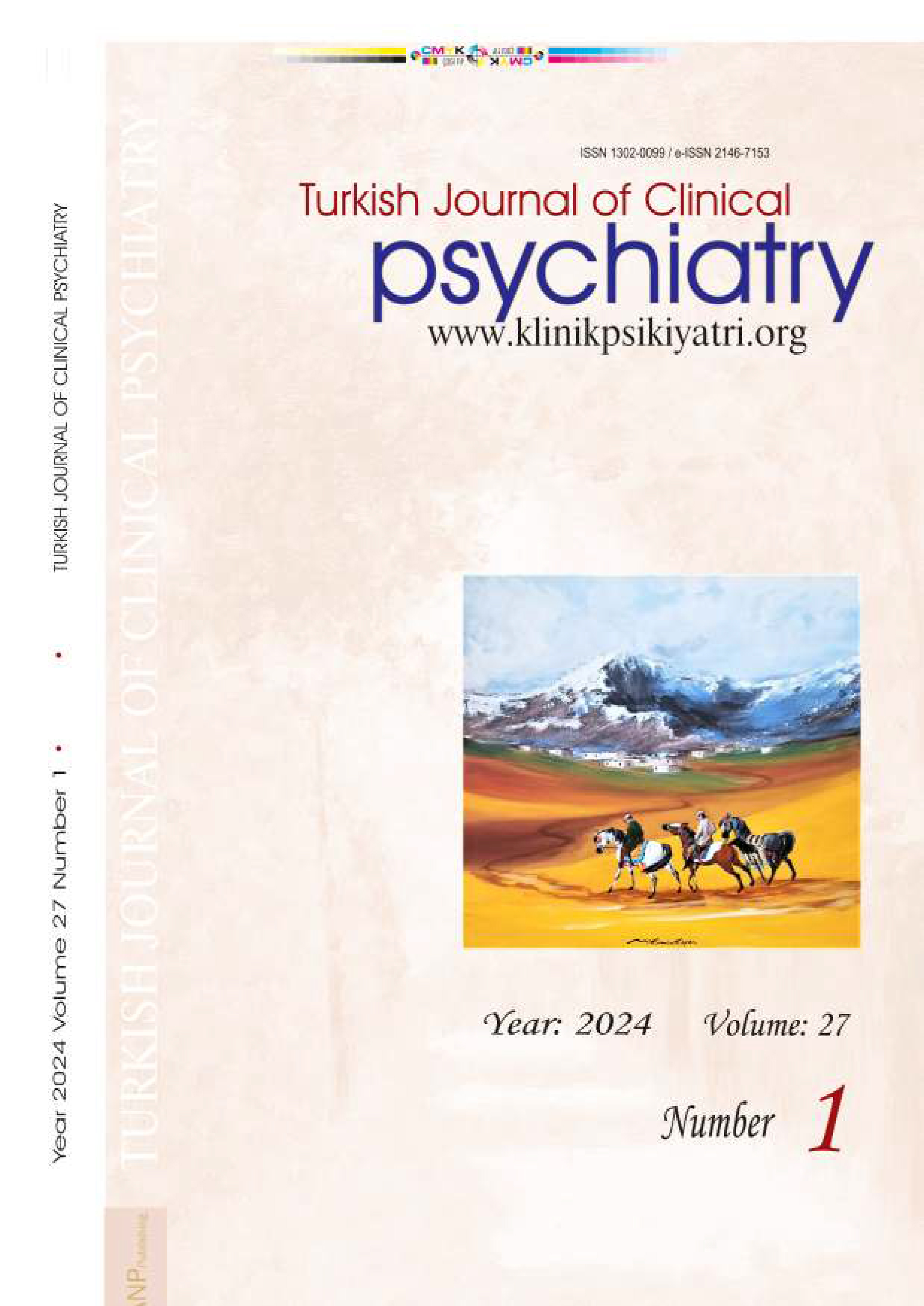





The Effect of Living with Family or Staying at Nursing Home on Depression and Anxiety Levels in a Group of Elderly Who Referred to an Outpatient Psychiatry Clinic
Serap Erdoğan Taycan1, Fatma Duygu Kaya2, Okan Taycan31Gaziosmanpaşa Üniversitesi Tıp Fakültesi Psikiyatri Anabilim Dalı, Tokat2Hulusi Alataş Elmadağ Devlet Hastanesi Psikiyatri Bölümü, Ankara,
3Haydarpaşa Numune Eğitim ve Araştırma Hastanesi Psikiyatri Bölümü, İstanbul
Objectives: The aim of this study is to compare depres- sion and anxiety levels between elderly who stay at nurs- ing home and live with their relatives. Method: Fifty five nursing home residents and 62 elderly living with their relatives who were presented to the psychiatry depart- ment of a state hospital between January 2008 and January 2009 were participated in this study. Medical and socio-demographic form, Standardized Mini-Mental State Examination, Geriatric Depression Scale, Hamilton Depression Rating Scale and Hamilton Anxiety Rating Scale were administered to the participants who were included to the study and obtained written informed consent. Results: The nursing home residents were found to be more likely to be male and less educated, having more depression and anxiety symptoms and especially higher somatic anxiety compared to the elder- ly living with their relatives, and having an experience of negative life events during the last three months was more common in elderly living with their relatives. We could not found any significant difference between the scores of the Geriatric Depression Scale, Hamilton Depression Rating Scale and Hamilton Anxiety Rating Scale of two group's scores by means of marital status, presence of chronic physical disorders and medical insur- ance, experience of negative life events during last three months. Conclusion: The relationship of somatic symp- toms with anxiety of elderly who stay at nursing homes need to be known and nursing home workers have to recognize this situation in order to refer these elderly to mental health professionals.
Keywords: Key Words: Elderly, nursing home, depression, anxiety, somatic anxiety.
Psikiyatri Polikliniğine Başvuran Bir Grup Yaşlıda Huzurevi ya da Aile ile Kalmanın Depresyon ve Anksiyete Düzeyine Etkisi
Serap Erdoğan Taycan1, Fatma Duygu Kaya2, Okan Taycan31Gaziosmanpaşa Üniversitesi Tıp Fakültesi Psikiyatri Anabilim Dalı, Tokat2Hulusi Alataş Elmadağ Devlet Hastanesi Psikiyatri Bölümü, Ankara,
3Haydarpaşa Numune Eğitim ve Araştırma Hastanesi Psikiyatri Bölümü, İstanbul
Amaç: Bu çalışmada, huzurevinde kalan ve evde yakınları ile birlikte yaşayan yaşlılar arasında depresyon ve anksiyete düzeylerinin karşılaştırılması amaçlanmıştır. Yöntem: Ocak 2008- Ocak 2009 tarihleri arasında bir devlet hastanesi psikiyatri polikliniğine başvuran, huzurevinde kalan 55 ve aileleri ile yaşayan 62 yaşlıdan bilgilendirilmiş onam alınanlara; tıbbi ve sosyode- mografik veri formu, Standardize Mini Mental Test, Geriatrik Depresyon Ölçeği, Hamilton Depresyon Derecelendirme Ölçeği ve Hamilton Anksiyete Değerlendirme Ölçeği uygulanmıştır. Bulgular: Huzurevinde kalan yaşlıların evde yakınları ile birlikte kalan yaşlılara göre; sayıca daha çok erkek ve düşük eğitimli olduğu, genel olarak daha yüksek depresyon ve kaygı belirtilerine sahip olduğu, özellikle daha çok somatik anksiyete belirtisi gösterdiği, son üç ay içinde yaşanmış olumsuz yaşam olayının evde yaşayan yaşlılar- da daha fazla olduğu belirlenmiştir. Kronik fiziksel hastalık varlığı, medeni durum, sosyal güvence varlığı, son üç ay içinde yaşanmış olumsuz yaşam olayı varlığı açısından iki grubun Geriatrik Depresyon Ölçeği, Hamilton Depresyon Derecelendirme Ölçeği ve Hamilton Anksiyete Değerlendirme Ölçeği puanları arasında anlamlı bir fark olmadığı bulunmuştur. Sonuç: Huzurevinde kalan yaşlılarda özellikle bedensel yakın- maların anksiyete ile ilişkili olabileceğinin bilinmesi, huzurevi çalışanlarının bu durumu tanıyarak yaşlıları ruh sağlığı profesyonellerine yönlendirmeleri gereklidir
Anahtar Kelimeler: Anahtar Sözcükler: Yaşlı, huzurevi, depresyon, anksiyete, somatik anksiyete.
Manuscript Language: English
(2997 downloaded)










